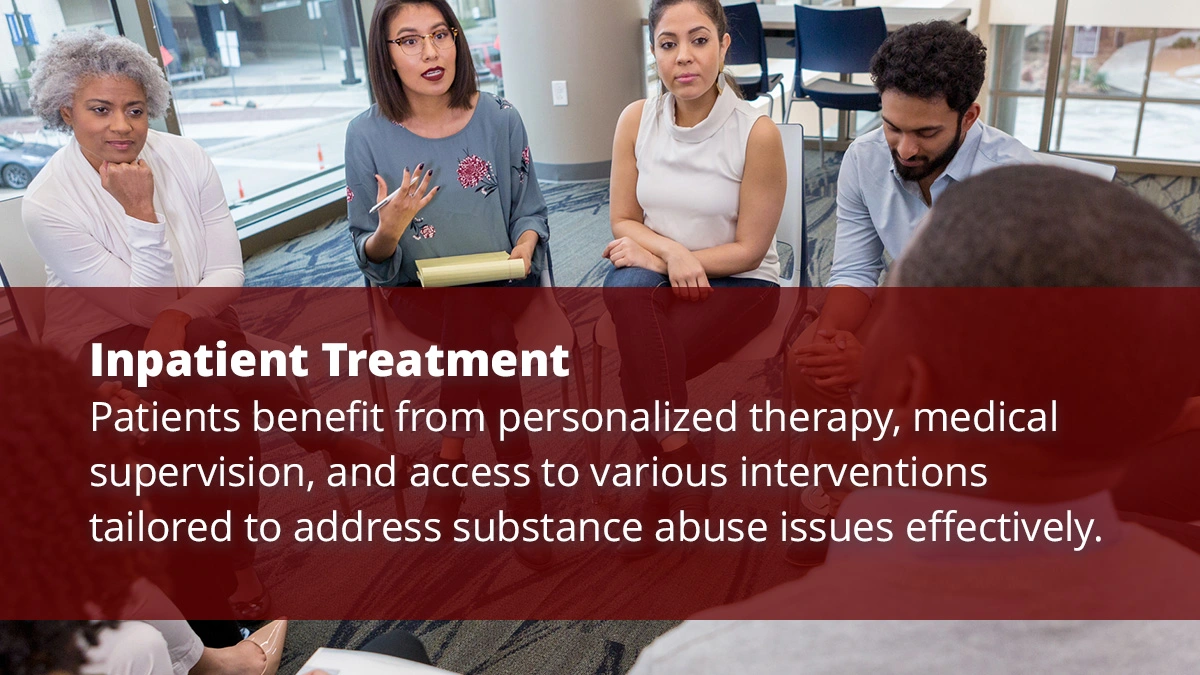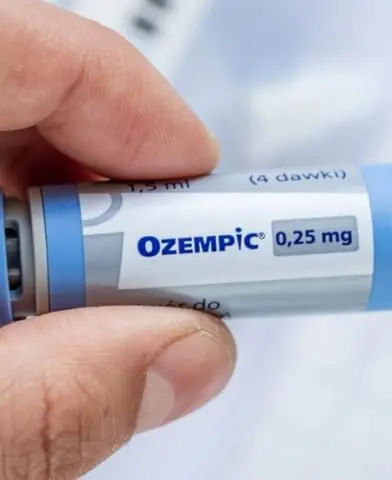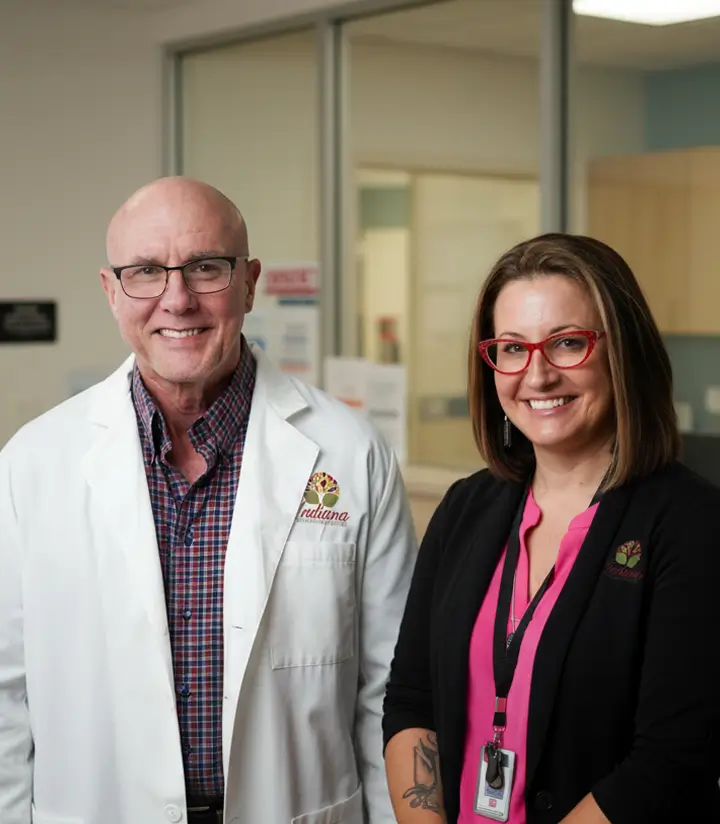
Guide To Inpatient Drug Rehab In Indiana
Clinically Reviewed by:
Inpatient drug rehab offers a vital lifeline to those struggling with substance abuse. Whether battling alcohol, opioids, or other substances, the specialized programs at Indiana Center for Recovery cater to diverse needs, offering personalized treatment plans and therapy sessions. Through medical supervision, counseling, and holistic therapies, inpatient rehab centers in Indiana aim to heal the body, mind, and spirit, empowering individuals to embrace a life of sobriety.

Key Takeaways
Addiction in Indiana is a serious issue, impacting individuals, families, and communities across the state. Here’s what you need to know:
- Inpatient drug rehab in Indiana provides intensive, 24/7 care for substance abuse, offering a structured environment for recovery.
- Patients benefit from personalized therapy, medical supervision, and access to various interventions tailored to address substance abuse issues effectively.
- These programs emphasize long-term sobriety by equipping people with the necessary resources for a successful transition back to everyday life post-rehab.
Contact Indiana Center for Recovery at (844) 650-0064 to reserve your spot in treatment.
Inpatient Drug Rehab in Indiana
Inpatient drug rehab in Indiana provides intensive treatment for individuals struggling with substance abuse. These programs offer a structured environment with round-the-clock care to help patients recover from addiction.
They typically include individual and group therapy, medical supervision, and holistic approaches to address the physical, mental, and emotional aspects of addiction. Inpatient rehab in Indiana can be a crucial step toward recovery, offering a supportive and immersive environment away from triggers and temptations.
Finding a program that meets the individual’s needs and provides a comprehensive approach to addiction recovery is important.
Choosing the Right Rehab Facility
Choose an addiction treatment center that meets your specific needs. Consider the location, treatment approach, and amenities offered. If possible, visit the facility to get a feel for the environment and meet the caring staff.
Program Length and Involvement
Program length can vary from facility to facility. Some programs last 28 days, while others may be longer. Choose a residential treatment program length for full recovery and ongoing support. Involvement in therapy and activities is also vital for success.
Dedicated Medical Staff and Therapists
A quality rehab facility should have a dedicated team of medical staff and therapists who are experienced in treating addiction. They should provide personalized care and support throughout the recovery process.
Services Offered in Inpatient Drug Rehab in Indiana
Inpatient drug rehab centers in Indiana offer a range of services to aid patients recover from substance abuse.
These services typically include:
Individual Therapy Sessions
Inpatient drug rehab centers in Indiana offer individual therapy sessions. These sessions involve meeting one-on-one with a therapist. The therapist helps you understand your addiction and develop coping strategies.
They also provide support and guidance throughout your recovery journey.
Group Therapy and Support Sessions
In addition to individual therapy, residential programs offer group and support sessions. These sessions provide a supportive environment to connect with others facing similar challenges.
You can share your experiences, learn from others, and build a support network to overcome substance use disorders.
Family Counseling
Family counseling is another important service offered in inpatient rehab centers. This involves therapy sessions with your family members. The goal is to improve communication, address family dynamics that may contribute to drug abuse, and strengthen your support system.
Medication-Assisted Treatment (MAT)
Some inpatient rehab centers in Indiana offer medication-assisted treatment (MAT). MAT involves using medications, along with therapy, to treat mental illness. These medicines can help manage withdrawal symptoms and reduce cravings, making it easier to focus on recovery.
Aftercare Services and Continuous Support
After completing treatment, inpatient alcohol rehab centers provide aftercare services and continuous support. This may include follow-up appointments, support groups, and access to resources to help you maintain your recovery.
Aftercare is an essential part of the recovery process, as it helps you transition back to everyday life and reduces the risk of relapse.
Benefits of Inpatient Drug Rehab
Inpatient drug rehab offers a structured and supportive atmosphere for individuals struggling with substance abuse. These programs provide a range of benefits that can greatly aid recovery.
Structured Treatment Programs
Inpatient drug rehab facilities offer structured treatment programs that provide a clear path to recovery. These programs include daily schedules with therapy sessions, group activities, and educational workshops.
The structured nature of these programs helps individuals stay focused on their recovery goals and encourages accountability.
24/7 Medical and Emotional Support
One of the major benefits of a residential treatment center is the round-the-clock medical and emotional support available to patients. This ensures that clients receive immediate expert care and attention whenever needed.
This support can be crucial in managing withdrawal symptoms and addressing any underlying mental health issues.
Therapeutic Environment for Recovery
Inpatient drug rehab provides a therapeutic environment that is conducive to recovery. This environment is free from distractions and triggers, allowing individuals to focus solely on their recovery journey. The supportive atmosphere of an inpatient art facility can also help people build a strong support network with peers and staff members.
Develop New Habits
Inpatient drug rehab provides people with the opportunity to develop new, healthy habits. These habits include regular exercise, nutritious eating, and practicing mindfulness. Developing these habits can greatly improve one’s overall health and well-being.
Additionally, learning to incorporate these habits into daily life can provide assistance to young people in maintaining their sobriety long after leaving the rehab facility.
How Rehabilitation Works
Rehab helps people struggling with drug addiction. It offers a path to recovery. Understanding how rehab works can help those seeking help.
Admission and Initial Assessment
The first step is admission. This involves entering the rehab facility. Next comes the initial assessment. Here, the rehab team evaluates the person’s needs and creates a personalized treatment plan.
Detoxification
Detoxification, or medical detox, is the next step. This is where the body rids itself of drugs or alcohol. It can be uncomfortable, but it’s an important part of recovery. Medical supervision is often needed during detox to ensure safety.
Therapy and Counseling
Therapy and counseling play a big role in rehab. They work to help people understand drug and alcohol addiction and learn coping skills. Individual and group therapy sessions are common. They provide support and guidance throughout the recovery process.
Transition and Aftercare
Transitioning back to everyday life can be challenging. Aftercare helps with this transition. It includes ongoing social support, such as counseling and support groups. Aftercare is important for maintaining sobriety and preventing relapse.
Finding the Right Inpatient Drug Rehab in Indiana
Finding the right inpatient drug rehab program in Indiana can be a crucial step toward recovery.
Here are three steps to help you choose a suitable program:
- Research Facilities: Look for inpatient addiction treatment centers in Indiana that offer programs for your specific needs, such as detoxification, therapy, and aftercare and mindfulness programs. Consider each facility’s location, amenities like a gym, and treatment approach.
- Check Credentials: Ensure that the rehab center is licensed and accredited. Look for certifications from organizations like the Commission on Accreditation of Rehabilitation Facilities (CARF) or the Joint Commission.
- Read Reviews and Get Recommendations: Look for reviews and testimonials from former patients and their families. Ask your healthcare professionals or a trusted source for recommendations based on your circumstances.
By following these steps, you can find an inpatient drug rehab program in Indiana that meets your needs and provides the support you need for a successful recovery.
Frequently Asked Questions (FAQ)
How long does the typical inpatient drug rehab program last in Indiana?
In Indiana, the typical inpatient addiction treatment facility program lasts around 30-90 days. Addiction treatment facilities offer these programs and often use a holistic approach, including a 12-step program and evidence-based care.
Residential programs offer support services every step of the way, assisting individuals with bipolar disorder and other mental health issues. Health insurance plans may cover these services.
Are family members allowed to visit during the inpatient drug rehab process in Indiana?
Yes, family members are often allowed to visit during the inpatient drug rehab process in Indiana. Family support is an important aspect of treatment, and many facilities encourage family involvement. Visitation policies may vary depending on the rehab center, so it’s best to check with the specific facility regarding their visitation guidelines.
Embrace Change with Indiana Center for Recovery
Indiana Center for Recovery delivers comprehensive inpatient drug rehab by pairing medical stabilization with individualized therapy: clients begin in physician-led medical detox to manage withdrawal safely, continue into structured residential treatment for 24/7 therapy, psychiatry, and MAT, then step down to outpatient care so the same clinicians support their return to daily life.
Our program covers co-occurring mental health needs through the integrated mental health track, uses evidence-based modalities (CBT, DBT, EMDR, TMS), and brings families into the process via family services across all Indiana campuses.
Call (844) 650-0064 to verify benefits (including IU Health Plans), arrange transportation, and secure an inpatient bed within days.






 100% Confidential
100% Confidential
